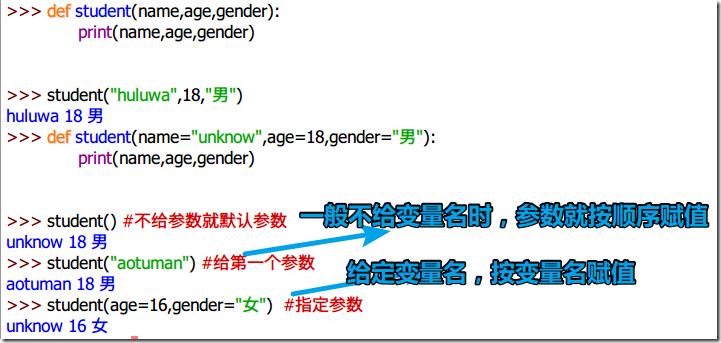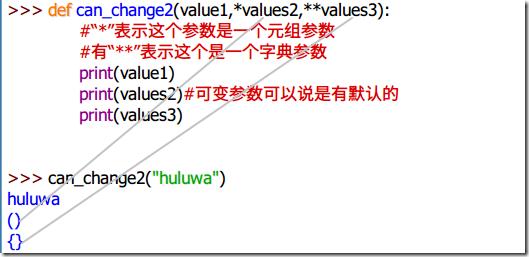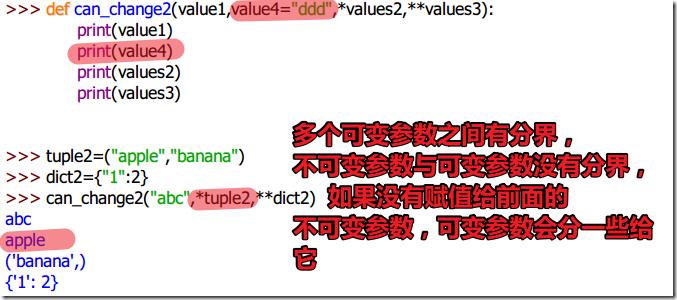本文实例讲述了Python函数的定义方式与函数参数问题。分享给大家供大家参考,具体如下:
涉及内容:
- 函数的定义方式
- 函数的文字描述
- 空操作语句
- 位置参数
- 默认参数
- 关键参数
- 可变长度参数
函数的定义方式:

函数的文字说明:
为了让别人了解函数的意义,或者避免自己遗忘,可以使用 字符串(不需要赋值,单引号,双引号,多引号都行)、#注释 将文字说明写在函数最开始的位置
def function1() : """ 这是这个程序的说明文字 """ print("hello function") return 1 function1()空操作语句:
pass语句是空操作语句,当使用pass代表不进行任何操作:
空函数就是什么操作也不执行,使用pass语句来定义
def pass_function(): passpass也可以使用在循环语句中:
if a>0: pass
函数的参数:
Python语言中的所有参数(参数)都将通过引用传递。如果在函数中更改引用类参数所指的内容,则更改也会反映在调用函数的外部
但当在函数中企图修改参数的数据指向的时候,外部传入的参数并不会被修改,因为当发生这样的情况时,函数自己产生了一个局部变量来避免错误修改外部变量:

如果确实要修改外部变量,那么需要在更改前,使用global来声明一下变量
print("------通过全局改变量--------") print("before:",x) def test_globol(): global x x=6 test_globol() print("after_test_globol:",x)如何进行函数输入参数类型检测:
1.当传入了不恰当的参数时,内置函数一般都会检查出参数错误并提示TypeError或ValueError,比如说
>>> int("abc") Traceback (most recent call last): File "<pyshell#37>", line 1, in <module> int("abc") ValueError: invalid literal for int() with base 10: 'abc' >>> int ('10') 10>>> int('10','12') Traceback (most recent call last): File "<pyshell#46>", line 1, in <module> int('10','12') TypeError: 'str' object cannot be interpreted as an integer这是因为内置函数一般都做了参数检查。
有时候为了让我们的函数更加完善,我们定义函数的时候需要考虑进行参数检查。
对参数类型做检查,数据类型检查可以用内置函数
isinstance()实现,raise可以抛出异常:""" if not isinstance(参数,(参数允许的类型1,允许的类型2...)) raise TypeError('自定义参数错误提示') """ def my_int(x): if not isinstance(x,int): raise TypeError("你输入的不是整数") print(x)位置参数:
- 根据位置一一对应赋值参数
def num002(a,b): print(a,b) keynum002("haha","helloworld")#a->"haha",b->"helloworld"默认参数:
1.默认参数可以简化参数的输入。
比如说某些多用的值就不必多余传入,一个例子是学生信息录入,大部分同年级学生都是同龄人,年龄一致,所以可以简化年龄参数的输入
- 不给定变量名时,按位置顺序提供默认参数
- 当不按顺序提供部分默认参数时,需要把参数名写上,并且给定参数名的变量不能在不给定参数名的变量
- 如果有参数没有默认值,那么这个“必需”参数定义的时候要在默认参数前

#如果有参数没有默认值,那么这个“必需”参数定义的时候要在默认参数前 def student2(name="aotuman",sex,age=18): print(name,sex,age) student("lili","m")由于默认参数会提前生成对象,所以对于可变对象,直接使用默认参数,可能会导致多个函数操作都是使用同一个变量:
print("默认参数的内存问题".center(50,"-")) def student3(name,sex,age=18): print(name,sex,age,id(age)) student3("lili","m") student3("lilei","f") #结果显示在使用默认参数的情况下,id(age)的内存指向相同 #所以要注意使用指向类的变量(列表.....)student3("hanmeimei","m",17) def my_append(x,list1=[]): list1.append(x) print(list1) my_append("haha") my_append("hehe") #结果显示默认参数中留下了上一次结果的数据如果要解决上面的问题,可以把默认参数赋值步骤移动到执行代码中:
print("改良结果".center(50,"-")) def my_append2(x,list1=None): if list1 is None: list1=[] list1.append(x) print(list1)
关键参数:
- 关键参数,在输入参数时,显式给定参数名来指定参数
- 但关键参数不能写在位置参数前面
#关键参数,在输入参数时,显式指定参数 print("\n-----关键参数-------") def keynum002(a,b): print(a,b) keynum002(b="haha",a="helloworld") """ keynum002(b="haha","helloworld") #这是不行的,关键参数是不能在位置参数前面的 """可变长度参数:
- 可变长度参数就是传入的参数个数是可变的
- 如果要传入多个参数,可以把参数存入list、tuple、dict类型的变量中,再把变量传给函数:
>>> def can_change(l): print("%s %s" % (l[0],l[1])) >>> l1=["apple","pen"] >>> can_change(l1) apple pen- python定义了可变参数的参数定义方式,参数前加*说明是一个元组,加**说明是一个字典,在传值的时候传入对应的元组或字典。
这种方式下,可变参数是有默认值的,默认为空元组或空字典。
如果同时使用*和**,“*”元组参数必须位于“**”字典参数之前

传入参数的时候,可以对对应的可变参数加对应的"*"或"**",避免某些时候传入参数的位置不对应函数参数位置的问题。



def change34(value1,*value2,**value3): print(value1,end='\t') print(value2,end='\t') print(value3,end='\t') change34((1,2))#* ** 有默认值 print("\n") change34(*(1,2))#1溢出到前面的value1 print("\n") change34(*(1,2),{1:1,2:2})#{1:1,2:2}溢出到前面的value2 print("\n") change34("value1",*(1,2),**{'1':1,'2':2}) print("\n") print("test2".center(50,'-'))
- 可使用多个关键字参数输入一个字典类的参数
def test2(**args):#**可以接受关键参数,*只能接受位置参数 print(args) test2(x=1,y=2,c=3) test2(**{'x':1,'y':2,'c':3})>>> a=[1,2,3,4,5,6] >>> def change(x): x.append("changed") >>> change(a) >>> a [1, 2, 3, 4, 5, 6, 'changed']
def test2(x): print(id(x)) test2(x) print(id(x))#同一片内存指向希望本文所述对大家Python程序设计有所帮助。
-
<< 上一篇 下一篇 >>
Python函数的定义方式与函数参数问题实例分析
看: 1249次 时间:2020-12-27 分类 : python教程
- 相关文章
- 2021-12-20Python 实现图片色彩转换案例
- 2021-12-20python初学定义函数
- 2021-12-20图文详解Python如何导入自己编写的py文件
- 2021-12-20python二分法查找实例代码
- 2021-12-20Pyinstaller打包工具的使用以及避坑
- 2021-12-20Facebook开源一站式服务python时序利器Kats详解
- 2021-12-20pyCaret效率倍增开源低代码的python机器学习工具
- 2021-12-20python机器学习使数据更鲜活的可视化工具Pandas_Alive
- 2021-12-20python读写文件with open的介绍
- 2021-12-20Python生成任意波形并存为txt的实现
-
搜索
-
-
推荐资源
-
Powered By python教程网 鲁ICP备18013710号
python博客 - 小白学python最友好的网站!